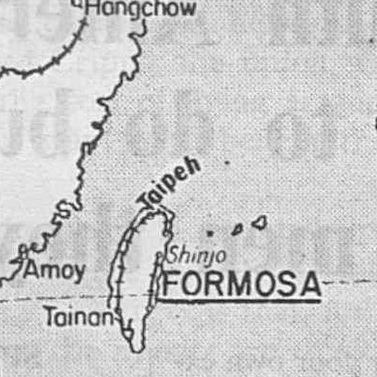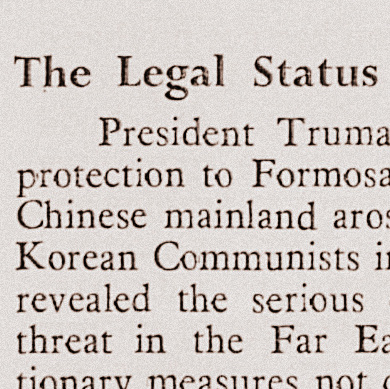在1951年2月24日刊行的英國《經濟學人》(The Economist)週報上、「海外世界」(The World Overseas)一欄中,有一篇報導戰後初期台灣狀況的文章,題目是〈福爾摩沙有多強壯?〉(How Strong is Formosa?),描述了自中國軍隊佔領以來歷任的行政長官與省主席治理的變遷;以下是全文及中文翻譯。
福爾摩沙有多強壯?
[香港特派員訊]
關於福爾摩沙究竟有多大能耐可抵抗中國共產黨襲擊的這一問題,並不能單就物質上的力量來解答。福爾摩沙人的士氣也必須納入考慮;而這不但受到國民黨統治的影響,也有賴於島民的歷史與傳統。日本的統治在政治與社會上是壓迫性的,而其所在的五十年來也持續受到各種不同程度的反抗。不過日本的確推動了工業與商業的發展,以及公共與社會的服務,而且他們也在此留下了一套完整的法律與秩序框架、公眾安全與有效的管理。而中國國民黨人,在這些面向上,並沒有任何一件能達到使人們免於大失所望所須的標準。島上的經濟性資源非常有限,又有長期而難解的地方動亂遺風,以及分離主義和精神上的獨立性(只有部分抵銷於對中國民族主義的依附),此外福爾摩沙人的閱讀能力──不同於其他中國人──使其能夠尋求外國協助,這使得現有政權很難在沒有美國人的緊密監視與大量物質援助下延續。
國民黨的首任行政長官陳儀的部隊,在1945年上陸之初就給人建立了不良印象;根據目擊描述,他們直衝岸邊的商店,掠劫貨物並欺壓民眾。腐敗、紀律的缺乏與不確定性迅速地擴散;相較於日本人治下,即便是極權而剝削,其秩序終究有著驚人的對比。報導顯示,貨幣管理問題,立刻就超越了日圓退出而由中國鈔票取代的問題;對此,官方聲明中僅提到有著「長時間的不確定性」。在一開始的六個月中,紙幣的發行量就乘上兩倍,而根據官方回報,在開頭的18個月中增加了六倍。被沒收的日本人資產,日後被以固定在通貨膨脹剛開始時的價格,拋售給了有權勢者。在國民黨公然實行的一黨體系之下,用人唯親的情況廣泛存在。在日本人治下,福爾摩沙的預算被劃分為「薪資與公署開銷」和「公共事業的施行支出」,兩者分別佔有百分之30與百分之70;而在陳儀的長官公署治下,官方數字則呈現著相反的比例,而且在收入方面大量增稅。一大群的投機者與「收刮客」來到島上;主要的活動,是透過整個政治與行政管理機器而從事的走私與巧取暴利。也有一大群平民從大陸湧入,而未在生產事務上有明顯的投資,更遑論對現存機構的充分維持。長官陳儀在1947年五月被撤離職位;據報他最近在1950年六月時因叛變而遭處決,他被指涉讓上海地區投降於共產黨,以求自身安全與財富的回報。
接下來的主席魏道明,在1947年五月接任陳儀。他做了一些努力,以消弭前任時期所帶來的敵意,當時終結於一場暴力──按照反抗政府人士所述,是反對派遭受屠殺後的一次武裝反抗,至於官方來源則稱之為一場廣泛散佈的暴亂(1947年二月28日)。較低階的機關似乎已經被魏氏「整頓」過了,但在高層卻未有廣泛的改變。持續湧入的部隊與平民對島上經濟帶來沈重壓力;許多新的公務機關成立,已有的機關則受到擴編。舉例來說,鐵路局的增員量此時已達到百分之25。銀行借貸大量增加,在比例上更勝小跑步般的通貨膨脹,且這些活動以投機佔絕大多數。不但沒有對新的固定資本的投資,現存的設施也正迅速地日趨惡化;舉例而言,1947年的重大水災,至少有部分是出於對灌溉系統的全面性忽視。這是造成糧食生產不足的主要因素,此外肥料的短缺也是原因。魏主席在1948年末離任,有一些令人失望的跡象,但未更加貧困。
繼任的主席陳誠,宣佈了計畫,要將台灣打造成重新征服中國的強大基地。(按其所稱)相對於他前兩任者的「日本集體主義」與「美國自由主義」,他宣稱其方法屬於「費邊式社會主義」。此時ECA已經在中國本部停止運作,福爾摩沙成為了針對「泛中國區域」撥款的主要繼受者。有個俏皮話也應運而生,稱費邊社會主義的第一項成就,是讓領導官員能夠買進新一年型號的美國汽車;不過明顯的改進不久後也到來。肥料的狀況開始有所改善。ECA也刺激了一定程度的工業設備恢復,且提供了技術上的監督。農耕上的改革也開始,其中美國援助與技術顧問扮演著重要的角色;租金受到限制,並改進了流程。
在1949年末,那費邊式主席由吳國楨來接替,這位先生聲望頗高,以進步的前上海市長而聞名。在他的治理與美國的合作之下,改進得以持續。然而島上的壓力仍然很大。住民人口數在1946年七月時才剛超過6,000,000,到了1950年三月已達到了7,450,000,又在1950年10月達到7,620,000。其中半數可能是自然增加(在這點上福爾摩沙是全世界增加速率最快者之一),不過這些數字顯示有八至十分之一的現有人口源自最近的政治移民,他們當中很少是直接的生產者。當上海淪陷(1949年五月25日)後,300,000人的國民黨部隊據稱到了福爾摩沙。這次突然的駐軍增加(顯然達到百分之200),後來還繼續著──現在當局宣稱有600,000人──而這將加諸於戰後島上達百分之20的平民人口增長。據指出福爾摩沙目前每十個人口中就要維持一名士兵與一名「非生產性」的官員,與之同時共產中國(目前為止,至於現在的戰爭狀態可能會改變這點),則每百人當中才有一名士兵與一名官員。一場貨幣改革在1949年六月生效;通貨膨脹進而恢復,不過是以較為和緩的步調。新幣最近大致維持於相當10.25元對1美元,相較之下1949年六月時的匯率是5元對1美元。
儘管有些改進的跡象,許多觀察者還是感覺到先前的投機、荒廢、掠奪與不穩定的紀錄,已經造成了無法挽回的傷害。福爾摩沙長久以來的動亂無法依靠武力根絕,而是要仰賴著大規模社會與經濟改革的安撫,這或許在此時仍不可企及;第五縱隊活動的可能影響,也是無法計算。福爾摩沙有句名言說「(在戰爭後)我們從狗(日本人)的統治換成了豬的統治。」而後來美國人(延續先前那套說法,不太客氣地被稱之為「養豬戶」)的參與,則帶來了相當程度的改進。目前當地人顯然還不希望轉換為「熊的統治」,但依舊有著深深的失望與些許漠然。
How Strong is Formosa?
[BY OUR HONGKONG CORRESPONDENT]
THE question of how great is Formosa’s ability to resist attack by the Chinese Communists cannot be answered in terms of material strength alone. The morale of the Formosans must also be considered; and this depends, not only on the effect of Kuomintang rule, but also on the history and traditions of the islanders. The Japanese regime was oppressive, politically and socially, and resistance to it continued to a varying extent throughout the fifty years of its existence. But the Japanese did promote industrial and commercial development and public and social services, and they did leave behind them a full framework of law and order, common security and efficient administration. In none of these respects have the Chinese Nationalists maintained the standards necessary to avoid acute disillusionment. The economic resources of the island are strictly limited, and the long and involved traditions of local unrest, separatism and spiritual independence (only partly offset by adherence to Chinese Nationalism) as well as the Formosans’ readiness—unlike other Chinese—to call in foreign help, makes it unlikely that the present regime will endure without close supervision and heavy material aid from the Americans.
The troops of the first Kuomintang Governor, Ch’en Yi, created a bad impression as soon as they landed in 1945; eyewitness accounts describe them as heading straight for the shops ashore, looting stocks and bullying the civilian population. Corruption, indiscipline and uncertainty spread rapidly, in startling contrast to the orderly, though totalitarian, exploitation under the Japanese. It is reported that currency manipulation began at once over the question of withdrawal of the Japanese yen and its replacement by Chinese notes; official statements merely note that there was “prolonged uncertainty” about this. The note issue doubled in the first six months, and increased sixfold in the first 18 months, according to official returns. Confiscated Japanese assets were sold off at the latter date to influential interests, at prices fixed when the inflation was just beginning. Under the avowedly single-party system of the Kuomintang, there was widespread nepotism. The Formosan budget under the Japanese had divided expenses between “salaries and office costs” and “running expenses of public undertakings” in the ratio of 30 per cent and 70 per cent respectively; the official figures under Ch’en Yi’s governorship show a reversal of these proportions, and on the revenue side a vast increase in direct taxation. A vast swarm of speculators and “carpet-baggers” descended on the island; smuggling and lucrative intrigue, running all through the political and administrative machinery, were major activities. There was a vast influx of civilians from the mainland, with no significant investment in productive activities, or even adequate maintenance of the existing facilities. Governor Ch’en Yi was removed from his post in May, 1947; he was recently reported executed for treason in June, 1950, having allegedly surrendered the Shanghai area to the Communists in return for his own safety and fortune.
The next Governor, Wei Tao-ming, succeeded Ch’en Yi in May, 1947. Some effort was made to counteract the hostile feeling remaining from his predecessor’s time, which had ended in a period of violence—described by opponents of the government as an armed rebellion after a massacre of oppositionists, and by official sources as widespread rioting (February 28, 1947). Minor offices appear to have been “purged” by Wei, but there was no sweeping change in the senior ranks. The continuing influx both of troops and civilians put a heavy strain on the economy of the island; many new offices were created, and existing offices enlarged. The Railway Bureau, for example, increased its staff by 25 per cent at this time. Bank loans increased enormously, more than in proportion to the cantering inflation, and activity was predominantly speculative. Not only was there no new investment in fixed capital, but existing installations were rapidly deteriorating; the serious floods of 1947, for example, were at least partly due to the total neglect of the irrigation system. Food production was unsatisfactory, for these general reasons, and also because of a shortage of fertiliser. Governor Wei left at the end of 1948, showing some signs of disappointment, but none of impoverishment.
The succeeding Governor, Ch’en Ch’eng, announced plans to build up Formosa as a powerful base for the reconquest of China. In contrast to the “Japanese collectivism” and “American liberalism” of his two predecessors, his own approach was declared to be that of “Fabian Socialism” [sic]. At this point ECA having ceased operations in China proper, Formosa became the main heir to the allocations for the “general area of China.” The quip was therefore made that the first achievement of Fabian Socialism was to enable leading officials to acquire American automobiles of the new year’s model; but distinct improvements were shortly to come. The fertiliser situation began to improve. ECA also stimulated a degree of industrial re-equipment, and provided technical supervision. Agrarian reforms also began, in which American aid and technical advice played a notable part; rents were restricted, and procedures improved.
The Fabian Governor was succeeded, at the end of 1949, by K. C. Wu, a man of high reputation, well known as a progressive former Mayor of Shanghai. Under his governorship the improvements, with American co-operation, appear to have continued. But the strain on the island is great. The civilian population, which was just over 6,000,000 in July, 1946, was 7,450,000 in March, 1950, and 7,620,000 in October, 1950. As much as half of this may be natural increase (in which Formosa has one of the highest rates in the world), but these figures mean that one in eight or ten of the present population are recent political immigrants, few of whom are direct producers. After the fall of Shanghai (May 25, 1949) 300,000 Nationalist troops are said to have reached Formosa. This sudden increase in the garrison (apparently by as much as 200 per cent), which continued—the authorities now claim 600,000—thus comes on top of a 20 per cent postwar increase in the civilian population of the island. It is pointed out that Formosa is maintaining one soldier and one “non-productive” official per ten of the population, whereas Communist China (so far, though the present war situation may change this) has had only one soldier and one official per hundred of the whole population. A currency reform was effected in June, 1949; inflation has since resumed, but at a milder pace. The new yuan has recently appeared fairly stable at about 10.25 to the US dollar, compared to the rate of 5 fixed in June, 1949.
In spite of some signs of improvement many observers feel that the previous record of speculation, depredation, delapidation and uncertainty has done irreparable harm. The age-old unrest in Formosa is ineradicable by force, and can be soothed only by spectacular social and economic reforms, which may be unattainable at the present time; the possible effect of fifth-column activities is incalculable. A popular Formosan saying is that “we have (since the war) exchanged the rule of the dogs (the Japanese) for that of the pigs.” Lately the participation of the Americans (unkindly described, in continuation of the saying just quoted, as “the swine-herds”) has effected considerable improvements. The “rule of the bear” does not yet appear to local people as a desirable alternative, but there is, all the same, deep disillusionment and some apathy.




